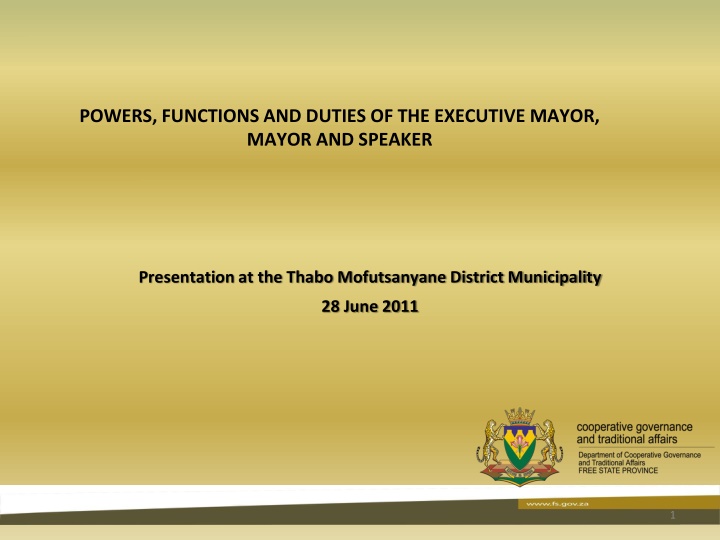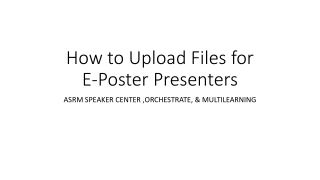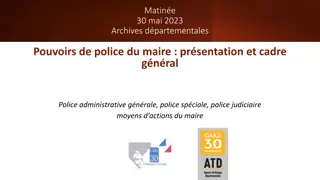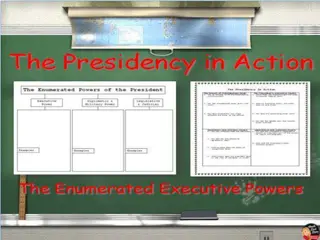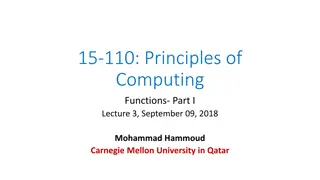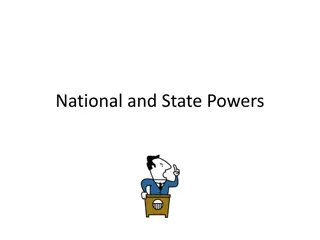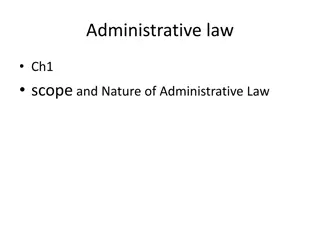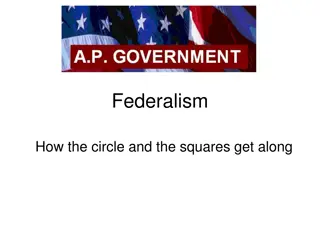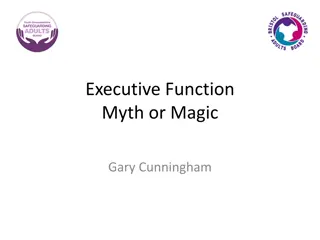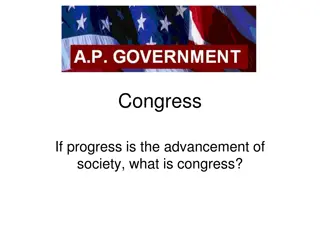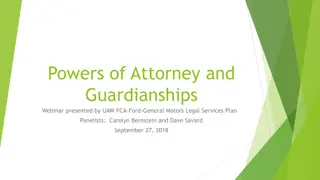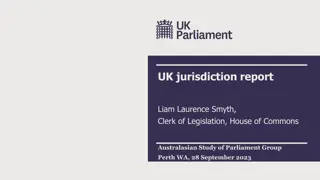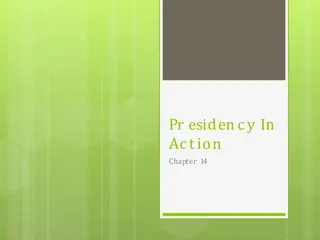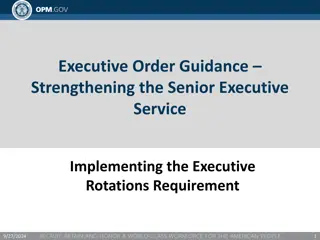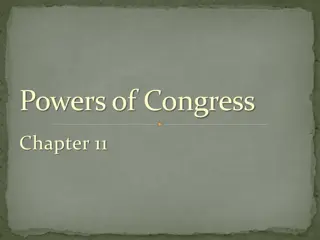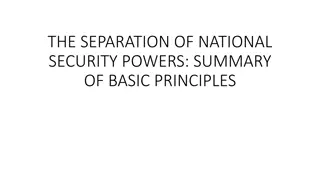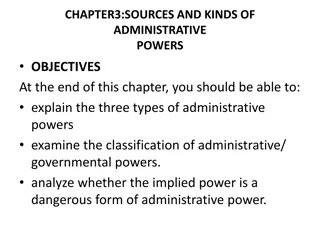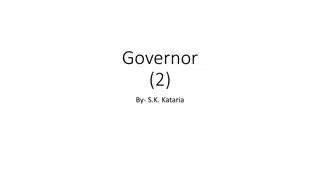Powers, Functions, and Duties of Executive Mayor, Mayor, and Speaker
Statutory powers, functions, and duties of the executive mayor, mayor, and speaker entail receiving reports, identifying municipality needs, recommending strategies, evaluating progress, overseeing service provision, and involving communities in municipal affairs. Delegation of powers, reporting to council, and consultation with the public are key aspects of their responsibilities.
Download Presentation

Please find below an Image/Link to download the presentation.
The content on the website is provided AS IS for your information and personal use only. It may not be sold, licensed, or shared on other websites without obtaining consent from the author.If you encounter any issues during the download, it is possible that the publisher has removed the file from their server.
You are allowed to download the files provided on this website for personal or commercial use, subject to the condition that they are used lawfully. All files are the property of their respective owners.
The content on the website is provided AS IS for your information and personal use only. It may not be sold, licensed, or shared on other websites without obtaining consent from the author.
E N D
Presentation Transcript
POWERS, FUNCTIONS AND DUTIES OF THE EXECUTIVE MAYOR, MAYOR AND SPEAKER Presentation at the Thabo Mofutsanyane District Municipality 28 June 2011 1
Statutory Powers, Functions and Duties of Executive Mayors An executive mayor is entitled to receive reports from committees of the municipal council and to forward those reports together with her/his recommendation to the council when he/she cannot dispose of the matter in terms of his/her delegated powers. Where there is not a specific committee established to investigate and make recommendations on a matter, the executive mayor would also receive reports emanating from the administration. 1. a) b) review and evaluate those needs in order of priority; c) recommend to the council strategies, programmes and services to address priority needs through the integrated development plan and the estimates of revenue and expenditure, taking into account any applicable national and provincial development plans; The executive mayor must:- identify the needs of the municipality; 2
Statutory Powers, Functions and Duties of Executive Mayors d) recommend or determine the best way, including partnership and other approaches, to deliver those strategies, programmes and services to the maximum benefit of the community; e) identify and develop criteria, including key performance indicators, for measuring and evaluating progress with the implementation of strategies, programmes and services; f) evaluate progress against the key performance indicators: g) review the performance of the municipality in order to improve the economy, efficiency and effectiveness of the municipality, the efficiency of credit control and debt collection and the implementation of the municipality's by-laws; h) monitor the management of the municipality's administration in accordance with the directions of the municipal council 3
Statutory Powers, Functions and Duties of Executive Mayors i) j) oversee the provision of services in a sustainable manner; perform such duties and exercise such powers as the council may delegate to her or him; annually report to the council on the involvement of communities and community organisations in the affairs of the municipality; and ensure that regard is given to public views and report on the effect of consultation on the decisions of the council. k) l) He/she may delegate any of her/his powers to the respective members of the mayoral committee. 4
Statutory Powers, Functions and Duties of Executive Mayors 2. The executive mayor must further- perform such ceremonial role as the council may determine; report to the municipal council on all decisions taken by her/him; appoint and may dismiss the members of the mayoral committee; determine the venue, time and date of meetings of the mayoral committee; exercise and perform those of her/his powers and functions as may be designated by the council, together with the other members of the mayoral committee; manage the drafting of the municipality's integrated development plan and submit the draft integrated development plan to the council; manage the development of the municipality's performance management system and submit the proposed system to the council 5
Statutory Powers, Functions and Duties of Executive Mayors 2.1 The executive mayor must further- oversee and monitor the implementation and enforcement of the municipality's credit control and debt collection policy and by-laws and the performance of the municipal manager in implementing that policy and by-laws; when necessary, evaluate or review the municipality's credit control and debt collection policy and by-laws, or the implementation of the policy and by-laws, in order to improve the efficiency of existing credit control and debt collection mechanisms, processes and procedures; and at such intervals as may be determined by the council report to the council on the municipality's credit control and debt collection policies and bylaws and their implementation. 6
Statutory Powers, Functions and Duties of Executive Mayors 3. Financial matters The executive mayor is also the councillor responsible for financial matters in terms of the Municipal Finance Management Act. As such she/he- must at least four months before the start of each financial year, prepare a draft annual budget for that financial year. must allow the public access to the draft budget by making it available at the main administrative office of the municipality and to submit written comments and representations to the municipality about it; must table the draft budget in the municipal council for discussions and public hearings; must submit a copy of the municipality's draft budget to prescribed institutions; 7
Statutory Powers, Functions and Duties of Executive Mayors 3.1 Financial matters must as soon as the council discussions and the public hearings on the draft budget have been completed prepare the budget for the financial year, and table the budget in the council for approval; must manage the budget process in such a way that the budget is tabled in the council at least 30 days before the start of the financial year to which that budget relates; table an adjustments budget in the municipal council as and when necessary; and must table any financial statements and reports received from the municipal manager at the first council meeting held after the receipt thereof. 8
Statutory Powers, Functions and Duties of Executive Mayors 4. Inferred powers and functions of the executive mayor The executive mayor must, in respect of the mayoral committee- Preside at public meetings and hearings called by the executive mayor. Receive petitions on behalf of the municipality when requested to do so by petitioners. Ensure compliance with the law, including the municipality's rules and orders, during mayoral committee meetings. Interpret the rules and orders of the municipality when required to do so during meetings of the mayoral committee, taking into account any prior rulings and interpretations made during other council or committee meetings. Ensure that her/his reports to the council are adequate for facilitating the council's oversight functions in relation to her/his office. 9
Statutory Powers, Functions and Duties of Executive Mayors 5. Preparation of legislation Section 160 (2) of the Constitution states that a municipal council may not delegate, amongst other things, the making of bylaws and that the adoption of bylaws require an absolute majority, i.e. a majority of all the councillors of the municipality must vote in favour of the adoption of a bylaw. However, section 30 of the Structures Act prohibits a council from adopting a proposed bylaw until it received a report and recommendation with regard to the proposed bylaw from the executive mayor. A municipality has the right to make bylaws for the effective administration of the matters assigned to it in terms of the Constitution and national and provincial legislation. 10
Statutory Powers, Functions and Duties of Executive Mayors 5.1 Preparation of legislation Part of the executive mayor's responsibility in respect of the preparation of proposed bylaws is to ensure that bylaws that are recommended to the council comply with the Constitution and any applicable national and provincial legislation. This means that the executive mayor should ensure that: the municipality is competent to legislate on the matter. a proposed bylaw is consistent with national or provincial legislation, if any. the proposed by-law does not conflict with the Bill of Rights or any other provision of the Constitution. the proposed bylaw complies with all the legal requirements for a bylaw. the proposed bylaw is prepared and available in all the official languages determined by the council in its language policy. 11
Statutory Powers, Functions and Duties of Executive Mayors 6. Integrity, privileges and immunities of councillors The executive mayor is the guardian of councillors' privileges and immunities in the mayoral committee. The privileges and immunities of councillors include freedom of speech during committee meetings and immunity from criminal and civil litigation in certain instances. Not only must the executive mayor ensure that councillors benefit from this special dispensation, she/he must also ensure that councillors do not abuse their privileges and immunities. This requires that the executive mayor must be absolutely certain what limitations, if any, the rules and orders of the municipality and other legislation, including the Constitution, imposes on councillors' freedom of speech. 12
Statutory Powers, Functions and Duties of Executive Mayors 7. Enforcing the code of conduct for councillors in mayoral committee meetings The executive mayor should, for the sake of uniformity, have similar arrangements with regard to enforcing the code of conduct in the mayoral committee as would be the case with the committees of council. 13
Statutory Powers, Functions and Duties of Executive Mayors 8. Agenda and minutes The executive mayor presides at mayoral committee meetings. This implies that she/he should be responsible for the preparation of the agenda that is circulated to mayoral committee members prior to any meeting. Items for the agenda originate from various sources in the municipality, e.g. the administration, portfolio committees, motions submitted by councillors and written questions submitted by councillors. The executive mayor must, for instance, ensure that the different reports that must be submitted to the mayoral committee are complete, are arranged in logical order in the agenda and are submitted in time for inclusion in the agenda. 14
Statutory Powers, Functions and Duties of Executive Mayors 8.2 Agenda and minutes She/he must also ensure that agendas are dispatched to mayoral committee members in reasonable timeframes to ensure that they have adequate time to prepare for meetings. The executive mayor should ensure that there are adequate facilities and resources for keeping minutes of mayoral committee meetings and other activities involving the mayoral committee, such as public meetings and public hearings. The executive mayor should ensure that minutes are of high quality, correct and accessible for councillors, employees and the public. 15
Statutory Powers, Functions and Duties of Executive Mayors 9. Meeting procedures The executive mayor must see to it that the provisions of the municipality's rules and orders with regard to mayoral committee meetings are adhered to. The rules and orders of the municipality may regulate the detail of the procedures during and conduct of mayoral committee meetings. Such procedures may, for example, prescribe behavioral rules. The executive mayor must therefore know the rules and orders that are applicable to the mayoral committee in order for her/him to consistently apply them. Rules and orders would, for example, determine what motions and proposals may and may not be made, when a motion or proposal must be disallowed, how an interview with a deputation must be conducted, how to deal with a petition tabled at a mayoral committee meeting and so on. 16
Statutory Powers, Functions and Duties of Executive Mayors 9.2 Meeting procedures As in the case of the code of conduct the executive mayor should have a record of all the Speaker's interpretations of the rules and orders, as well as precedents that developed through application and enforcement of the rules to ensure consistent application thereof. 10. Order The degree of order or lack thereof during mayoral committee meetings will reflect positively or negatively on the image of the municipality as a whole, although mayoral committee meetings are often more relaxed and less formal than council meetings. 17
Statutory Powers, Functions and Duties of Executive Mayors 10.1 Order The executive mayor is responsible, in respect of mayoral committee meetings, for promoting members' freedom of speech, subject to the municipality's rules and orders. She/he must however, also adjudicate the content of councillors' contributions to discussion in the mayoral committee for compliance with the rules and orders of the municipality and other legislation. 18
Statutory Powers, Functions and Duties of Executive Mayors 11. Decision-making at mayoral committee meetings The question of decision-making at mayoral committee meetings must be understood within the context of the advisory nature of this committee. The main purpose of this committee is to "assist" the executive mayor in the exercise and performance of her/his powers and functions. The manner of decision-making may exclude any form of voting. The reason for this is because the final decision-maker is the executive mayor and she/he takes full responsibility for all consequences relating to all decisions taken at that committee. 19
Statutory Powers, Functions and Duties of Executive Mayors 11.1 Decision-making at mayoral committee meetings The executive mayor is responsible, in respect of mayoral committee meetings, for promoting members' freedom of speech, subject to the municipality's rules and orders. She/he must however, also adjudicate the content of councillors' contributions to discussion in the mayoral committee for compliance with the rules and orders of the municipality and other legislation. 20
Statutory Powers, Functions and Duties of Executive Mayors 12. Admission of public to mayoral committee meetings In terms of section 160 of the Constitution read with section 20(1) of the Systems Act, mayoral committee meetings are in principle open to the public and the media. However, section 20(3) of the Systems Act empowers a mayoral committee to close all its meetings provided it is reasonable to do so having regard to the nature of the business being transacted. Section 20(2) of the Systems Act prohibits a mayoral committee from closing its meetings to the public and the media when considering or voting on any of the following matters:- 21
Statutory Powers, Functions and Duties of Executive Mayors 12.1 Admission of public to mayoral committee meetings a draft by-law; a budget; the municipality's draft integrated development plan, or any amendment of the plan; the municipality's draft performance management system, or any amendment of the system,; the decision to enter into a service delivery agreement referred to in section 76 (b) of the Act; or any other matter prescribed by regulation. 22
Statutory Powers, Functions and Duties of Executive Mayors 12.2 Admission of public to mayoral committee meetings The executive mayor must facilitate the implementation of section 20(1) and (2) of the Systems Act insofar as it deals with the public and media's admission to mayoral committee meetings. The executive mayor must ensure that she/he can explain the legal requirements for meeting in a closed session and must apply those rules consistently from one meeting to another. The executive mayor must ensure that members of the public are seated in designated areas from where they can observe the proceedings of the mayoral committee. 23
Statutory Powers, Functions and Duties of Executive Mayors 12.3 Admission of public to mayoral committee meetings The rules and orders of municipalities usually authorize the executive mayor to have any person who refuses to comply with any ruling made by her/him or who persistently disrupts a meeting removed from the meeting. The executive mayor must therefore ensure that arrangements had been made for the presence of one or more employees or other persons for this purpose. The executive mayor determines the time, date and venue for mayoral committee meetings. When the executive mayor makes her/his decision, she/he must take into account whether the designated venue offers enough room to accommodate members of the public who may wish to attend such a meeting and whether there are not other meetings taking place on that date and time, e.g. a council seating. 24
Statutory Powers, Functions and Duties of Executive Mayors 13. Granting of leave of absence Item 3(a) of the Code of Conduct for councillors provides that councillors can be granted leave of absence for meetings they are required to attend in terms of applicable national or provincial legislation or the council's rules and orders. Item 4(2) of the code of conduct determines that a councillor who is absent from three or more consecutive committee meetings which she/he was required to attend, i.e. in respect of which she/he did not have leave to be absent, must be removed from office as a councillor. The executive mayor must therefore ensure that an attendance register is circulated and completed by all mayoral committee members during mayoral committee meetings. She/he would have to make arrangements that the attendance register is regularly submitted for inspection to those responsible for councillor attendances. 25
Statutory Powers, Functions and Duties of Executive Mayors 14. Compliance with the code of conduct in mayoral committees The Structures Act states that the Speaker must ensure compliance in the council and committees with the code of conduct for councillors. (The Constitutional Court has ruled that the Mayoral Committee is not a committee of council) This requires at a minimum that the Speaker must establish a system of communication with the executive mayor as chairperson of the mayoral committee to discuss matters relating to the code of conduct. The executive mayor should inform the Speaker of issues related to and possible transgressions of the code of conduct. An example is the attendance by councillors of committee meetings. The same rule as with council meetings applies to the attendance of committee meetings. . 26
Statutory Powers, Functions and Duties of Executive Mayors 15. Ceremonial functions The council can decide that the executive mayor should fulfill certain ceremonial functions. This would depend on the circumstances within the municipality (see Item 19 below). 16. Appeals in terms of Access to Information Act Section 74 of the Access to Information Act 2000 (Act No 2 of 2000) provides for an internal appeal procedure against decisions taken by the information officer (the municipal manager) of a municipality regarding requests for access to information held by the municipality. The Act requires that every municipal council must appoint an appeal authority to consider any appeals against a decision by the information officer. A council may decide to designate the executive mayor as the appeal authority in terms of the Access to Information Act. 27
Statutory Powers, Functions and Duties of Executive Mayors 17. reports from delegated bodies In municipalities with mayoral executive systems, the council may delegate powers to the executive mayor. It is a general requirement of delegation in terms of section 63 of the Systems Act that a delegated body (i.e. the person or body to whom a power had been delegated or sub-delegated) must in writing report on the exercise of her/his delegated powers at such intervals as the delegating authority (i.e. the person or body that delegates or sub-delegates the power concerned) may determine. Should any powers, including ceremonial powers, be delegated to the executive mayor, she/he must also comply with this requirement. Delegated powers of the executive mayor and Receiving 28
Statutory Powers, Functions and Duties of Executive Mayors 18. Proposed delegated powers of executive mayors The executive mayor- must, after consultation with the municipal manager, identify those of the municipality's activities that need a specific committee of councillors to investigate, discuss, evaluate and report to him/her and make recommendations to the council; must appoint a member of the mayoral committee as chairperson for each committee established by the council; may delegate to such committees any of his/her powers, but is not divested of the responsibility concerning the exercise of such delegated powers; 29
Statutory Powers, Functions and Duties of Executive Mayors 18.1 Proposed delegated powers of executive mayors The executive mayor- must ensure, in consultation with the municipal manager, that a proper committee service responsible for the agenda and minutes is in place for each such committee, that any such committee meets regularly and submits reports to him/her timely; receives reports with recommendations from departmental heads through the office of the municipal manager on all matters that must be handled by either the executive mayor or the council in terms of these delegations and for which a specific committee has not been created to consider the matter beforehand. 30
Statutory Powers, Functions and Duties of Executive Mayors 18.2 Proposed delegated powers of executive mayors The executive mayor- must consider the matters raised in such reports and must either dispose of them in terms of his/her delegated powers, or must forward them with his/her recommendation to the council for consideration; receives reports with recommendations from the committees established for specific matters, considers the matters raised in these reports, and must either dispose of them in terms of his/her delegated powers, or must forward them with his/her recommendation to the council for consideration; is responsible for the quality and speed of decision-making; must ensure that integration between the various committees take place; 31
Statutory Powers, Functions and Duties of Executive Mayors 18.3 Proposed delegated powers of executive mayors The executive mayor- plays a prominent role, in consultation with the municipal manager, in building, maintaining and enhancing a good relationship between the council, councillors and the administration; is responsible for political supervision of the administration in terms of council resolutions and the law; is responsible for liaison with the community, ward committees, other committees and councillors and political office-bearers in the different spheres of government; should be available on a regular basis to interview the public and visitors to the municipal offices, and to interact with prominent business people as well as developers, and 32
Statutory Powers, Functions and Duties of Executive Mayors 18.4 Proposed delegated powers of executive mayors The executive mayor- may exercise any of the powers of the municipality except such powers- (i) as may be reserved by resolution of the council for the council; (ii) as may be reserved by law for the council; and (iii) the exercise of which requires a resolution taken by a majority other than a simple majority. 33
Statutory Powers, Functions and Duties of Executive Mayors 19. Proposed ceremonial functions of the executive mayor The following ceremonial powers could be delegated to the executive mayor: Opening projects, civic functions and events and new buildings Hosting and welcoming dignitaries to the municipality Advocating council policy Representing the council at civic events Leading/championing campaigns initiated by the mayor or the council Representing the council during disasters "First citizen" Patron for local organizations on an invitation basis 34
Statutory Powers, Functions and Duties of Executive Mayors 20. Appointment of mayoral committee members Section 60 of the Structures Act requires that when the council of a municipality with a mayoral executive system has more than nine members, the executive mayor must appoint a mayoral committee from amongst the councillors "... to assist the executive mayor". In terms of section 60(3) of the Act the executive mayor must exercise those powers and perform those functions designated by the council, together with the other members of the mayoral committee, i.e. not alone. Of course the executive mayor may, in her/his discretion, decide to submit other matters also to the mayoral committee before she/he takes a decision. 35
Statutory Powers, Functions and Duties of Executive Mayors 21. CODE OF CONDUCT Mayors may not: undertake any other paid work if she/he is a full-time councillor, unless the Council has expressly consented thereto; act in any way that is inconsistent with their office, or expose themselves to any situation involving the risk of a conflict between their official responsibilities and private interests; or, use their position or any information entrusted to them, to enrich themselves or improperly benefit any other person. ; 36
Statutory Powers, Functions and Duties of Executive Mayors 21.1 CODE OF CONDUCT Mayors shall: Be accountable to the council and the electorate for their actions; Administer the council in accordance with National and Provincial legislation and policy, and the bylaws, decisions, resolutions, policies and procedures of council, where applicable; Act at all times in accordance with the national Constitution in its entirety and in particular with the provisions on co-operative governance; Provide council with reports concerning matters under their control. full and regular 37
Statutory Powers, Functions and Duties of Executive Mayors 22. Good Government, Democracy and Equality All Mayors shall, in the performance of their functions, be committed to the prevention and the eradication of all forms of unfair discrimination. All Mayors shall implement in the sphere of their work, the measures and programmes considered to be necessary and which are aimed at redressing historical and all other forms of imbalances and injustice. Mayors shall, as members of the council perform their duties in the interest of the municipality as a whole and in defence and promotion of the integrity of the nation, avoiding measures that would prejudice the National welfare. Mayors shall explicitly take the responsibility for the effective and efficient administration of their municipality so as to achieve the aims of government policy and implement the laws of the country. 38
Statutory Powers, Functions and Duties of Executive Mayors 23. Clean Government All Mayors shall, at all times, observe practices that are free from all forms of corruption. Government office, position or privileged information shall not be used to distribute favours or patronage nor to seek or obtain any personal fortune or favour. Mayors shall not be active in professional associations or societies, unless Council has expressly consented thereto. In order to facilitate clean government and exemplary behaviour, all Mayors shall declare their assets and financial interests to Council as contemplated in the Councillor Code of Conduct. They shall disclose all consultancies, shareholdings and directorships or any other form of pecuniary benefit received by dependent family members (including those received by their immediate spouses) from an external source. 39
Statutory Powers, Functions and Duties of Executive Mayors 23.1 Clean Government Mayors shall not play any active role in profit-making Institutions. They shall surrender directorships and their shares shall be held in "blind trusts" which shall be managed by independent trustees. The trustees shall conclude all share transactions and Mayors shall have no influence over these transactions or trustees. Mayors or immediate dependent members of the families of Mayors, may not serve on the boards of public companies or own shares in companies directly connected with the Mayor's official duties. The test in these cases shall be whether the Mayor could advantage such companies over their competitors, or whether the families could derive improper benefit from such associations with such companies. 40
Statutory Powers, Functions and Duties of Executive Mayors 23.2 Clean Government Only small gifts and gifts offered on official occasions may be accepted, provided that Mayors have satisfied themselves that the gifts are not being presented to influence them in an improper manner. Mayors shall register any gift received, which in their estimate exceeds the value of R1000,00 or such amount as may be determined by the Minister from time to time. Gifts that are seen to be of a traditional/customary nature, need not be registered. 41
Statutory Powers, Functions and Duties of Executive Mayors 24. Confidentiality and matters of Office No matters entrusted to Mayors in their official duties, that can be considered to be private and confidential, shall be disclosed, whether directly or indirectly, to any party not authorised to be in receipt of that specific information concerning such matters. 25. Application The provisions of the Code of Conduct shall apply to all Mayors and Executive Mayors, including such councillors that from time to time may perform the duties of the Mayor during his or her absence. 42
Statutory Powers, Functions and Duties of Mayors in Collective Executive The powers of the mayor in a plenary executive are in substance the same as that of the mayor in a collective executive. 1. Governance matters The mayor of a municipality with a collective executive system has the following statutory powers and functions in terms of the Municipal Structures Act: presides at meetings of the executive committee; performs the duties, including any ceremonial functions, and exercises the powers delegated to her/him by the municipal council or the executive committee and determine the date, time and venue of ordinary and special executive committee meetings. 43
Statutory Powers, Functions and Duties of Mayors in Collective Executive 2. Financial matters In terms of the Municipal Finance Management Act, the mayor is the councillor responsible for financial matters of the municipality. As such she/he:- must at least four months before the start of each financial year, prepare a draft annual budget for that financial year; must allow the public access to the draft budget by making it available at the main administrative office of the municipality and invite them to submit written comments and representations to the municipality with regard to the draft budget; must table the draft budget in the municipal council for discussions and public hearings; must submit a copy of the municipality s draft budget to the national or provincial treasury, the district municipality in whose area it falls, in the case of a local municipality and the local municipalities in its area, in the case of a district municipality; must as soon as the council discussions and the public hearings on the draft budget have been completed prepare the budget for the financial year, and table it in the council for approval; must manage the budget process in such a way that the budget is tabled in the council at least 30 days before the start of the financial year to which that budget relates; table an adjustments budget in the municipal council as and when necessary; must table in the council at the first council meeting held after the receipt thereof any financial statements and reports received from the municipal manager regarding a list of prescribed matters. 44
Statutory Powers, Functions and Duties of Mayors in Collective Executive 2.1 Financial matters The mayor:- must as soon as the council discussions and the public hearings on the draft budget have been completed prepare the budget for the financial year, and table it in the council for approval; must manage the budget process in such a way that the budget is tabled in the council at least 30 days before the start of the financial year to which that budget relates; table an adjustments budget in the municipal council as and when necessary; must table in the council at the first council meeting held after the receipt thereof any financial statements and reports received from the municipal manager regarding a list of prescribed matters. 45
Statutory Powers, Functions and Duties of Mayors in Collective Executive 3. Inferred powers and functions of the mayor The powers and functions of the mayor that is incidental to her/his stipulated statutory functions, are similar to that of the Speaker, although only in relation to the executive committee and not the council as a whole. This means that the mayor must, in respect of the executive committee- Preside at public meetings and hearings called by the executive committee. Receive petitions on behalf of the municipality when requested to do so by petitioners. Ensure compliance with the law, including the municipality s rules and orders, during executive committee meetings. 46
Statutory Powers, Functions and Duties of Mayors in Collective Executive 3.1 Inferred powers and functions of the mayor Interpret the rules and orders of the municipality when required to do so during meetings of the executive committee, taking into account any prior rulings and interpretations made by the Speaker. Ensure that the executive committee s reports to the council are adequate for facilitating the council s oversight functions in relation to committee and mayor. 47
Statutory Powers, Functions and Duties of Mayors in Collective Executive 4. Preparation of legislation Section 160 (2) of the Constitution states that a municipal council may not delegate, amongst other things, the making of bylaws and that the adoption of bylaws require an absolute majority, i.e. a majority of all the councillors of the municipality must vote in favour of the adoption of a bylaw. However, section 30 of the Structures Act prohibits a council from adopting a proposed bylaw until it received a report and recommendation with regard to the proposed bylaw from the executive committee. A municipality has the right to make bylaws for the effective administration of the matters assigned to it in terms of the Constitution and national and provincial legislation. Because Speakers control the proceedings of municipal councils, they have clear responsibilities with regard to the legislative process in the municipal council. These responsibilities require that she/he must protect and promote the integrity of the legislative process. 48
Statutory Powers, Functions and Duties of Mayors in Collective Executive 4.1Preparation of legislation Part of the mayor s responsibility in respect of the preparation of proposed bylaws is to ensure that bylaws that are recommended to the council comply with the Constitution and any applicable national and provincial legislation. This means that the mayor should ensure that: the municipality is competent to legislate on the matter. a proposed bylaw is consistent with national or provincial legislation, if any. the proposed by-law does not conflict with the Bill of Rights or any other provision of the Constitution. the proposed bylaw complies with all the legal requirements for a bylaw. the proposed bylaw is prepared and available in all the official languages determined by the council in its language policy. 49
Statutory Powers, Functions and Duties of Mayors in Collective Executive 4.1Preparation of legislation Part of the mayor s responsibility in respect of the preparation of proposed bylaws is to ensure that bylaws that are recommended to the council comply with the Constitution and any applicable national and provincial legislation. This means that the mayor should ensure that: the municipality is competent to legislate on the matter. a proposed bylaw is consistent with national or provincial legislation, if any. the proposed by-law does not conflict with the Bill of Rights or any other provision of the Constitution. the proposed bylaw complies with all the legal requirements for a bylaw. the proposed bylaw is prepared and available in all the official languages determined by the council in its language policy. 50
